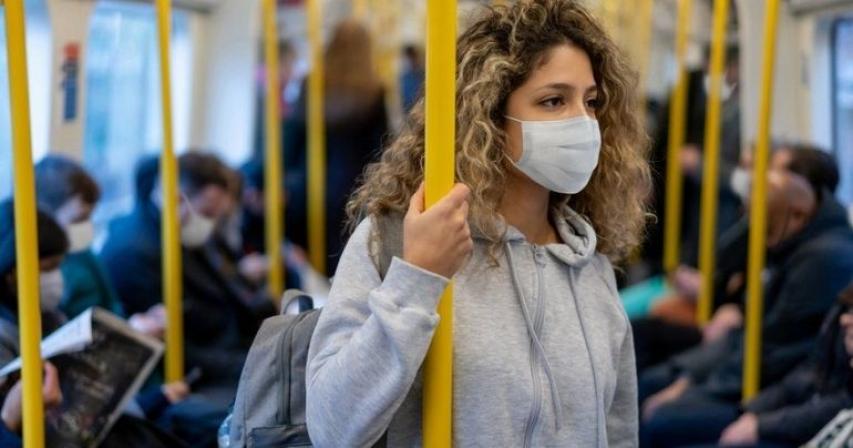Covid: Bus and train firms must decide whether to require masks
- 3 years ago

The government has said bus and train companies must decide whether passengers will be required to wear face coverings on their services from Monday, when Covid rules are relaxed.
Face masks have been mandatory on public transport for the past year to reduce the spread of the virus.
But those rules will be replaced with government guidance advising passengers to wear masks only on busy services.
Transport firms will be left to decide whether to enforce that advice and how.
Health Secretary Sajid Javid said masks would still be "recommended" on public transport, but people without a face covering would no longer be fined after restrictions are eased on 19 July.
Nevertheless, bus and train companies will still be able to turn away passengers who refuse to wear one - unless they are exempt.
Transport Secretary Grant Shapps said it was "up to them" to decide whether to make face coverings compulsory for passengers.
London Mayor Sadiq Khan said the safest option would be to continue to legally require people to wear masks on public transport.
His comments came as Labour criticised the government's approach to unlocking in England as "high risk" and "fatalistic".
While virtually all legal restrictions in England will be lifted on Monday, some guidance will remain.
There will no longer be any limits on how many people can meet and the 1m-plus distancing rule will be removed.
Nightclubs will also be allowed to reopen for the first time since March 2020 and capacity limits will be removed for all venues and events.
But nightclubs and other venues with large crowds will be encouraged to use Covid status certification - so-called domestic vaccine passports - "as a matter of social responsibility", Prime Minister Boris Johnson said on Monday.
Government guidance to work from home where possible will be lifted, but ministers are encouraging a gradual return to the workplace.
On face coverings, Mr Johnson said: "We expect and recommend that people wear a face covering in crowded and enclosed spaces where you come into contact with those you don't normally meet, such as on public transport."
The Confederation of Passenger Transport - a trade group representing bus and coach companies - said passengers will find it "difficult to understand" why the prime minister has "singled out public transport as somewhere to wear a face covering when a range of other activities share its characteristics."
The group said it wanted clear guidance for operators and customers, adding that it was important to respect everyone's right to choose whether to wear a face covering once restrictions had eased.
The Rail Delivery Group, which represents train companies, said its members would ask passengers to wear face coverings in busy indoor settings "out of respect for others".
It said enhanced cleaning would continue after 19 July and train companies would provide better information about how busy services are.
Wales' First Minister Mark Drakeford confirmed masks would continue to be required on public transport and in healthcare settings "even if" the nation relaxes restrictions, which are due to be reviewed on 15 July.
Rules regarding face coverings are due to be considered next month in Northern Ireland, which is due to ease some Covid measures on 26 July.
Scottish First Minister Nicola Sturgeon is due to make an announcement about restrictions on Tuesday. Scotland is expected to move to level 0 - the lowest level of restrictions in its roadmap - on 19 July and lift most legal restrictions on 9 August.
The prime minister said it was vital to proceed with "caution" in England after 19 July, warning "this pandemic is not over" .
The peak of the current wave is not expected before mid-August and could lead to between 1,000 and 2,000 hospital admissions per day, according to government scientists.
Central estimates from modellers advising the government also show that Covid deaths are expected to be between 100 and 200 per day at the peak, although there is a large amount of uncertainty.
On Monday, the UK recorded 34,471 new cases, as well as six deaths within 28 days of a positive test.
It was the sixth consecutive day that cases were above 30,000.
The number of deaths recorded on Mondays are often lower due to reporting lags over the weekend.
More than 45.9 million people - or 87% of adults in the UK - have now had at least one dose of a Covid-19 vaccine. And more than 34.8 million - around two-thirds of adults - have had both doses.
Source: BBC
Comments